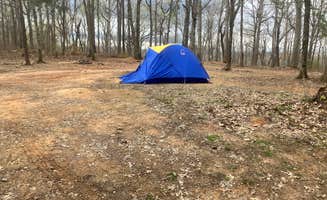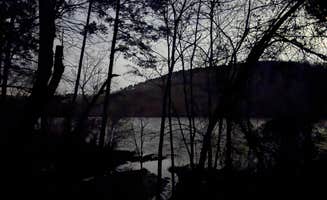Uwharrie National Forest encompasses 51,000 acres of mixed hardwood forest, with elevations ranging from 350 to 1,000 feet. Located approximately 1 hour east of Monroe, North Carolina, the forest features numerous unmaintained forest service roads with primitive camping spots scattered throughout. These dispersed sites require visitors to bring all necessary supplies and follow strict pack-in, pack-out protocols.
What to do
Off-roading trails: Uwharrie contains extensive OHV trails requiring appropriate vehicles and permits. "We took our Jeep on the OHV trails and had a blast. There are several places you can take a canoe or kayak on and the scenery on the lake was beautiful as well," notes visitor Erica who stayed at multiple dispersed sites.
Water activities: The Little River provides recreational opportunities for kayakers and boaters. One regular visitor explains, "Me and my friends would always float our kayaks down the river to a place we called 'Bird Dog' and camp for the night. If you are looking for a place that has very little traffic, this is the place you want to go!" according to visitor Wyatt about the Little River National Forest Area.
Backpacking: The 20-mile Uwharrie Trail runs north-south through the forest. "The trailhead is kind of hard to follow sometimes, sections of the trail are prone to flooding and creek crossings can become difficult following heavy rains. Overall, however, the forest is a good place for backpacking in this region of the state," explains Sean R., who appreciated the available water sources for filtering.
What campers like
Seclusion: Many dispersed campers appreciate the privacy found at free camping sites near Monroe, North Carolina. "This area was a place that I went often to deer hunt in the fall. I have never came across another camper/hunter at this location. It is a good location if you are looking for an area that is away from camp grounds and heavy traffic," reports Wyatt M. about a hunting area just southwest of Troy, NC.
Established fire rings: Most primitive sites contain basic stone fire rings. "This is a great area for dispersed campers with 4WD or AWD. It's pretty popular so head out early to secure your spot. Most sites have rock fire pits and room to set up," notes Zachary S., who recommends arriving early to claim your preferred location.
Water access: Creeks and streams throughout the forest provide both scenic camping and water filtration options. "Along the Uwharrie trail. Water available on both sides of camp / trail," reports Wayne R., highlighting the practical water access at sites along the main trail.
What you should know
Vehicle requirements: Many dispersed camping areas require appropriate transportation. "This is a great area for dispersed campers with 4WD or AWD. It's pretty popular so head out early to secure your spot," advises Zachary S., emphasizing both vehicle needs and competition for prime spots.
Passes and permits: Some areas require overnight passes. "There are 6 different stores/gas stations that have the overnight passes available for purchase. We got our passes from Eldorado outpost and the attendants there were very knowledgeable and helpful!" explains Erica.
Campsite conditions: Expect truly primitive conditions with no facilities. "You cannot drive up to the campsites. There are no electric, water, or sewer hookups. If you are camping along the Uwharrie Trail or the Dutchman's Creek Trail, it is completely primitive," explains Myron C., who still enjoyed his experience despite the basic conditions.
Tips for camping with families
Choose accessible locations: For families with young children, the Falls Dam Trail area offers more accessible camping. "Had a good time camping and enjoyed the song of wind and birds," reports Daniel R. about Dispersed Camping off Falls Dam Trail, a free camping area near Monroe with easier access.
Pack sufficient water: No potable water exists at primitive sites. "Obviously, there are no facilities, so I had to take my own water and a water filter. Since I was close to a stream, I had to take care of personal business about two hundred feet farther away," explains Myron C. about his Uwharrie Trail camping experience.
Site cleanliness: Teaching children leave-no-trace principles is essential. "Some of the sites may have a little trash left from the last user, so please try to leave it cleaner than you came to," suggests Zachary S., highlighting the community responsibility for maintaining these free camping areas.
Tips from RVers
Generator camping: RVs can access some primitive areas but must be self-sufficient. "The State Forest has camping. We used our pop-up with a generator in rustic locations. There are hiking, horse, OHV, dirt bike, ATV, and mountain bike trails," shares Bart, who found suitable spots for his pop-up camper.
Site selection: Finding level ground is crucial for RV camping. "The tent sites nice and clean and level. The host drove through many many times in the 3 days I was there," notes Chris, whose experience suggests that some areas receive regular ranger patrols despite being primitive.
Supply planning: No hookups or facilities exist for RVs at dispersed sites. Plan accordingly for water, waste, and power needs with no resupply options available on-site.



